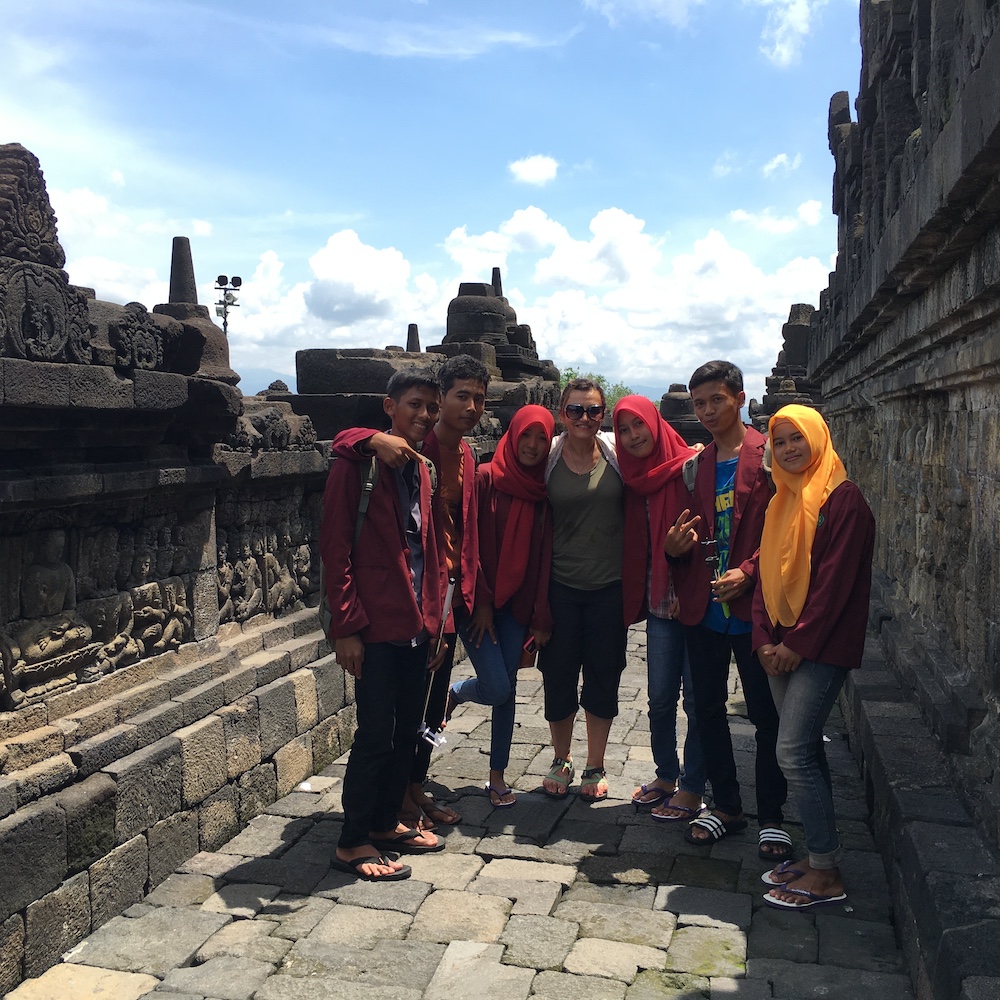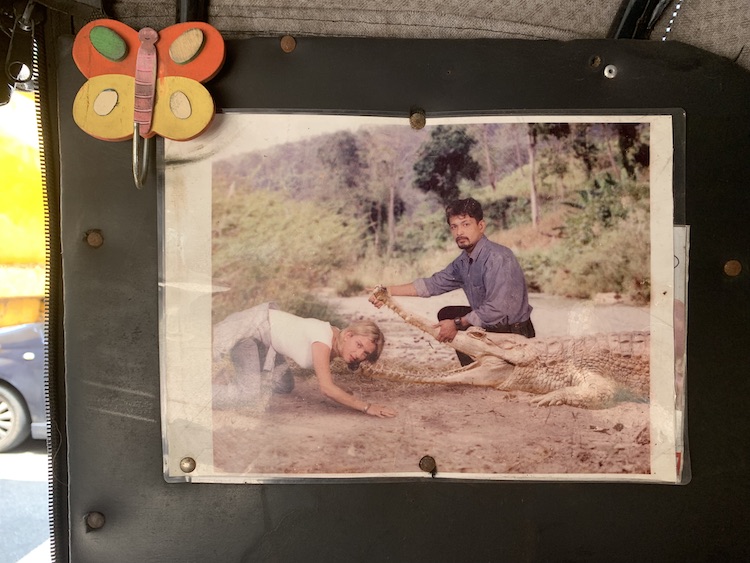Global etiquette is simply a code of polite behavior that is important at home and abroad. When discussing global etiquette this means behaving politely and respectfully in a different culture. Cultures have social rules that one must respect and follow. Below are just some of the items to consider when traveling abroad.
PLACES OF WORSHIP

On average, tour groups are composed of different people who come from various places around the world. The tour groups are usually led by locals who have knowledge about the focus of the tour. Paying attention to the tour guide, watching him or her, and taking notice of what is said is not only respectful to the guide but also to the whole group. In addition, paying attention helps someone focus on what is being said and learn. Avoid taking an excessive number of selfies that draw attention away from the tour, indicating to the group that the focus is on you rather than the location.Also, avoid the chit-chat that distracts others. Being respectful lets the guide know you not only appreciate his or her work but also show others one of the important character traits.

CLOTHING: Tank tops, shorts, mini-skirts, low-cut shirts, muscle shirts, etc. are not a symbol of respect while visiting a religious or spiritual place. Dress accordingly to show respect for your host culture.
SHOES: the general rule is to take off your shoes when you enter a temple (a hint will be to find the shoes outside the religious site. MOBILE phones MUST be turned off or in vibrate mode.
GENERAL DRESS CODE
When it comes to the general dress code, I always make sure to do some research before arriving at a destination. I prefer not to stand out as a tourist. I take into consideration if it is a religious or traditional place and as a woman, I check if I need to cover my shoulders, knees, and so on. Once I arrive, I carefully observe what the locals are wearing. Are they dressed casually in shorts and tank tops? Or do they dress more formally? In certain cities, wearing shorts or dressing too casually may not be the norm. When I travel to the Middle East, I also check if I need to wear a headscarf (hijab) depending on the specific location. If I have a meeting with locals, I find it helpful to simply ask them about the appropriate attire. I make it clear that I want to dress respectfully, as locals may otherwise say that anything is acceptable. Sometimes, as foreigners, we are given the “privilege” of wearing whatever we want without even realizing it. However, it is always best to take advantage of the opportunity to interact with people and learn from them. Being observant and spending less time focusing on ourselves is always a positive approach.



It is not advisable to dress like locals in cultures different from our own, as it may be inappropriate and could involve religious meanings that we do not adhere to.
MOBILES PHONES
It is widely known that it is impolite to be on the phone while conversing with someone. We divert someone’s attention to give it to another person who is not physically present. Being on the phone while in the presence of someone gives the impression of being distracted and disinterested in the interaction. It is important to recognize that in certain cultures, this “disrespect” is taken very seriously and can lead to significant misunderstandings. I recall a situation during my trip to Turkey where a woman was expelled from a tour because she incessantly talked on the phone, causing the tour guide to struggle to convey information amidst her constant chatter.
A big question here; WHY!!!????
Why are we spending so much time and money on a trip/experience if we are not living in that very present moment on location? If I need to be on the phone every day communicating back home, I feel I should be home. I can’t be in two places at once, nor can I learn from the new place while being so distracted, of course!

NOISE AND GESTURES
The standard guideline to be in any public place is to exhibit a cordial, friendly, and equitable exchange. There is no need to become upset or display excessive vocal or physical gestures. Not being loud and vocal can be a struggle for individuals from cultures where being expressive is a cultural characteristic. Therefore, it is a universal principle to actively listen, remain composed, and understand how to maintain a calm and serene demeanor when necessary.

It is crucial to maintain a moderate volume when in public with a group. I have observed numerous instances where groups of individuals from different backgrounds (including myself as a foreigner) tend to be excessively loud in restaurants, shops, and particularly pubs (thanks to alcohol). When visiting public places, it is essential to cultivate the skill of “listening,” and to do so, we must practice silence. Silence provides an opportunity to understand the culture and appropriate behavior at that specific moment, making it a valuable learning experience. By embracing silence, we learn to listen, which demonstrates respect. Ultimately, our travels are centered around learning, aren’t they?
TIPPING

Tipping is an essential part of etiquette as it demonstrates thoughtfulness and gratitude. There are individuals who go above and beyond to ensure our stay, meal, or journey is exceptional. Whether it’s assisting with luggage or holding a door open for me – knowing I tend to carry a lot – I am truly grateful for these gestures. Expressing appreciation fosters positive and harmonious relationships, recognizing the efforts of others and fostering empathy towards our surroundings. It is important to remember that many individuals rely on these tips for their livelihoods!


CRITICISM

The most hurtful behavior of a traveler in a host culture is to visit a country and criticize it. I have heard folks criticizing food in front of waiters, talking about dirty places, and bashing a country’s government. Traveling to another country is a privilege that deserves gratitude. You don’t have to agree with the way animals might be treated or how the government might be corrupt. You do need to be respectful because I am sure if you are asked about your own country of birth, there will be a lot of criticism that you would have never thought about! Just don’t patronize anyone.
RESPECT OF ECOSYSTEM
As experienced travelers, we have witnessed the devastating impact of tourism on the ecosystem. It is disheartening to observe young individuals swimming and surfing to interact with turtles, disregarding the clear signs prohibiting such activities. Moreover, they also engage in fishing for endangered species in areas where it is unnecessary. It is important to realize that it takes 10,000 years for a coral reef to grow, making these actions truly detrimental. The ecosystem requires a delicate balance, as the extinction of one species can disrupt the entire system, putting other species at risk of extinction as well.


RESPECT TOUR GROUPS AND GUIDES
On average, tour groups are composed of different people who come from various places around the world. The tour groups are usually led by locals who are knowledgeable about the focus of the tour. Paying attention to the tour guide, watching him or her, and taking notice of what is said is not only respectful to the guide but also to the whole group. In addition, paying attention helps someone focus on what is being said and learn. So avoid taking too many selfies that distract the whole tour letting the group know that it is more about you than the place (you can do this on your own at your own pace). Also, avoid the chit-chat that distracts others when the guide is speaking or questions are asked. Being respectful lets the guide know you not only appreciate his or her work but also show others one of the important character traits.

Respect when traveling shows the host country our gratitude for sharing their culture with us





